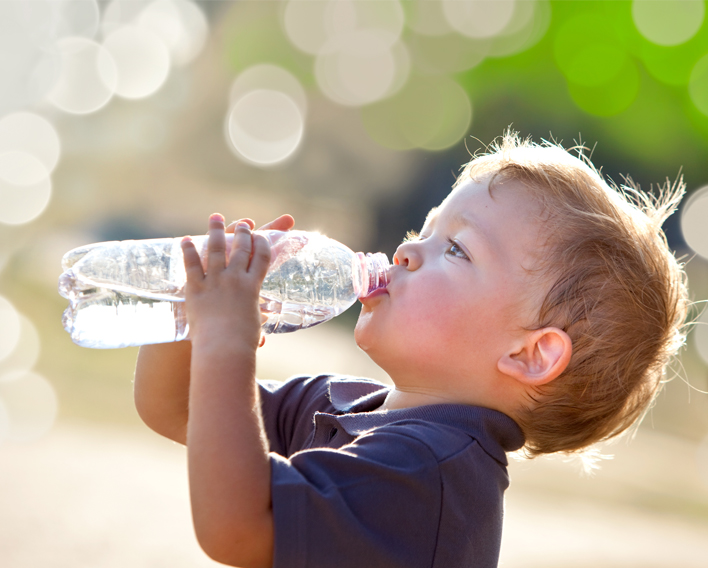Beat the Heat: Essential Tips for a Safe and Healthy Summer
Produced by:


As the hot summer weather begins, so do fun events like festivals, concerts, and BBQs where there can be potential health risks associated with extreme heat. According to the CDC, extreme heat claims the lives of over 1,200 people in the United States each year.¹ Although these statistics are concerning, heat-related deaths and illnesses are preventable. Certain groups, including athletes, infants and children, and older adults ages 65 and above, are at a higher risk of suffering from heat-related illnesses.² By understanding who is at risk and implementing preventive measures, we can avoid these types of illnesses this summer.
There are a variety of heat-related illnesses, but they are preventable.³ What are some of the warning signs of heat-related illnesses and what should I do?
- Who is at most risk?⁴
- Infants and young children
- People 65 years or older
- People who have mental illness, chronic health conditions or take certain medications
- Pregnant people⁵
- Athletes and those who work outdoors
- What are the common heat-related illnesses?
- Heat stroke: a severe, potentially life-threatening condition that happens when the body can’t regulate its temperature, stops sweating and cannot cool down. Symptoms of heat stroke include confusion, loss of consciousness, hot, dry skin or profuse sweating, and seizures. Body temperature may soar to 106°F or more in just 10 to 15 minutes When suffering from heat stroke, 911 services should be called; without immediate medical help, it can lead to death or lasting harm. ⁶
- Heat exhaustion: the body’s response to an excessive loss of water and salt, usually through excessive sweating[1] It is most likely to occur in elderly people, people with high blood pressure and those who work or exercise in a hot environment. Symptoms include headache, nausea, dizziness, heavy sweating and elevated body temperature. A person who is suffering from heat exhaustion should get medical help right away if symptoms are severe, worsening or not improving. Pregnant women and people with underlying medical conditions should touch base with their healthcare provider even for mild symptoms. ⁷
- Heat cramps: muscle pains or spasms (typically in the abdomen, arms or legs) that may occur with strenuous activity. People who sweat a lot during activity are prone to heat cramps as sweating depletes the body’s salt and moisture causing painful cramps. ⁸
- Heat rash: skin irritation caused by excessive sweating. ⁹
If you are experiencing any type of heat-related issues, please call for help and move to a cool location out of the sun. You can also follow these important tips from the CDC to protect your health during extreme heat.
- Stay cool indoors – Stay in air-conditioned places as much as possible.
- Schedule outdoor activities for the cooler times of day
- Pace yourself and cut down on exercise during high temperatures
- If outside, get to a cool area or into the shade and rest frequently
- Wear sunscreen
- Do not leave children, vulnerable adults or pets in the car
- Avoid hot and heavy meals
- Stay hydrated and drink plenty of fluids10
- Never leave kids in a parked car – temperatures inside a car can rise almost 20 degrees Fahrenheit within the first ten minutes, even with a window open. Children left unattended in a hot car are at the greatest risk for heat stroke.11
During the hot summer months, it’s important to be aware of the risks of heat-related illnesses. To protect ourselves and others, we should stay hydrated, seek shade, and avoid doing strenuous activities when it’s extremely hot. We should also check on people who may be more sensitive to the heat, like our neighbors, friends and family members. By taking these precautions, we can safely enjoy our summer activities and make the most of the season!
——————————————————-
¹ Extreme Heat | Natural Disasters and Severe Weather | CDC
²Extreme Heat | Natural Disasters and Severe Weather | CDC
³Extreme Heat | Natural Disasters and Severe Weather | CDC
⁴Heat and Pregnancy | Extreme Heat | Risk Factors | CDC
⁵Extreme Heat | Natural Disasters and Severe Weather | CDC
⁶Heat Stress Related Illness | NIOSH | CDC
⁷Heat Stress Related Illness | NIOSH | CDC
⁸Heat Stress Related Illness | NIOSH | CDC
⁹Heat Stress Related Illness | NIOSH | CDC
Dermatologist-approved skincare tips for beginners
Learn how to start a skincare routine with expert advice from Dr. Mark Lichtenberg. Discover essential tips for healthy, glowing skin at any age.
Read articleAging vs Alzheimer’s symptoms
Understand the key differences between age-related memory loss and Alzheimer’s symptoms to support early diagnosis and care planning.
Read articleSpotting stroke signs and symptoms
Learn to recognize the signs of a stroke with the F.A.S.T. method: Face drooping, Arm weakness, Speech difficulty, and Time to call 911. Early detection and quick action can save lives. Discover more about stroke symptoms and prevention from Optum Medical Care’s expert neurologists
Read article7 tips to boost workout motivation
Sticking to a new workout plan can be challenging, but staying motivated is key. Discover how understanding your reasons for exercising, setting realistic goals, scheduling dedicated time, and having accountability can keep you on track. If you’re feeling a lack of motivation, check out these 7 tips to help you stay committed and achieve your fitness goals.
Read article